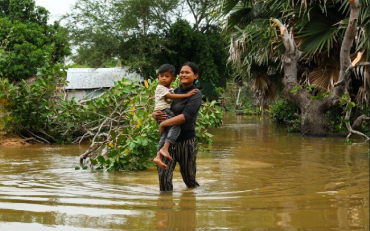This statement is being issued by the International Disability Alliance (IDA) and the International Disability and Development Consortium (IDDC) as COP26 – the United Nations Climate Change Conference - is taking place.
IDA and IDDC are calling on all Member States and other actors attending COP26 to ensure that the rights of persons with disabilities are protected, respected and fulfilled in design, implementation and monitoring of environmental degradation, climate adaptation and climate mitigation pledges and policies. Immediate measures must be taken to ensure removing environmental, attitudinal, communication, and institutional barriers hindering participation of persons with disabilities in climate action negotiations, processes and events. Without meaningful inclusion and participation of persons with disabilities and their representative organizations, climate action is missing fifteen per cent of our planet’s population who have the right, responsibility, and capacity to be part of the solution to this global crisis.
Persons with disabilities, despite being recognised as most at risk of the impact of climate change, have been largely excluded from decision-making processes and outcomes under the UN Framework Convention on Climate Change (UNFCCC), as well as from States’ climate change policies and plans at the domestic level. The impact of climate change poses a significant threat to the enjoyment by persons with disabilities of several human rights, including the right to life, safety, self-determination, freedom of movement, health, education, housing, livelihood, food, water, sanitation, culture, and property. All of this is especially pertinent for persons with disabilities living in low-income countries. Persons with disabilities are long recognised as one of the groups living at the greatest risk of poverty, exposed to discrimination and continually facing attitudinal, environmental and communication barriers which prevent their participation in decision-making. Such barriers are often made worse when disability intersects with age, gender, sexuality, refugee, migrant, indigenous and minority identities.
Not being part of the decision making and solution finding processes means that the skills and experiences of persons with disabilities as natural problem solvers, developed through finding solutions to overcome the barriers they face on an everyday basis, are not being utilised in the global efforts to combat climate change. This must change, States must meaningfully include persons with disabilities in all decision-making processes, thus allowing them to fully enjoy their rights on an equal basis with others.
As COP26 takes place bringing a sharp focus to measures needed to combat climate change, States and other actors must design and implement disability-inclusive policies that enhance and protect, rather than undermine, the human rights of persons with disabilities. IDA and IDDC reiterate the recommendations made in the paper issued by the International Disability Alliance, and call on all States and other actors to implement these recommendations which are in line with international law and build on recommendations by the Human Rights Council and the Office of the High Commissioner of Human Rights (OHCHR).
